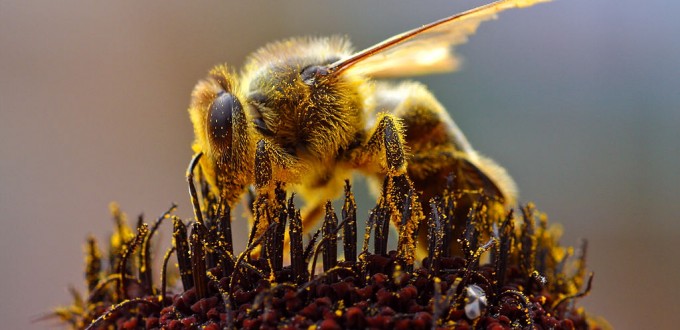
By Christina Sarich at undergroundreporter.org
Maryland — Maryland just led the way to save bees from harmful pesticides by passing a bill to eliminate the use of neonicotinoids, a first for any state in America. This class of agricultural chemicals is especially harmful to these important pollinating insects. In a major victory to protect the bees locally, the state will hopefully compel others to pass similar laws.
Known as the “angels of agriculture,” bees pollinate 71 of the 100 crops that comprise the majority of the world’s food supply and many of the fruits and vegetables grown in Maryland and across the United State. Honeybees and other pollinators are responsible for 1 of every 3 bites of food we eat. They are absolutely key to our food supply. Sadly, more than 500 different neonic products are currently on the market in America, contributing to the bees’ demise.
Neonicotinoid pesticides (Neonics), cause confusion in bees when they forage for food and attempt to fly back to their hives. Neonics also make bees more prone to diseases and parasites.
Maryland beekeepers were immensely compelled to pass legislation protecting pollinating insects, as according to the USDA, last year the state lost 61 percent of its honeybee population — two times more than the national average. Sustained bee loss is estimated to be around 10-15 percent — meaning Maryland’s bees could possibly face extinction if something drastic didn’t change.
If Italy’s success is any example of what we can expect in Maryland — the country was able to support bee rehabilitation with a neonic ban after losing more than 30 percent of its bee population — there may yet be hope for the bees in the U.S.
Fortunately, both the House and Senate passed the bill with bipartisan support just in time to possibly save Maryland’s bees. Maryland’s new law banning neonicotinoids helps set a precedent other states will hopefully follow. Although the problem of bee colony collapse is especially marked in Maryland, other states have been experiencing similar loss of their bees. In this state, though, honeybee pollination accounts for a $26 million-dollar agricultural industry. Without bees, many foods we rely on, and that support this economy, would be in trouble.
Activists have been trying to get bills like Maryland’s passed for years now due to growing scientific evidence that neonicsharm pollinating insects and aquatic life, like blue crabs. Our entire ecosystem is affected by neonic pesticides, and what affects our environment eventually affects us.
Though neonicotinoids are most commonly used in agriculture, they are also used in gardens, lawns, and landscapes — all contributing to the problem for bees. In fact, some gardeners apply neonics at rates 120 times that which would be applied in industrial agriculture. So if home gardeners want to help protect the bees they can stop using this class of pesticides and consider growing their flowers, plants, fruits, and vegetables organically. Maryland’s residents will be looking for new ways to garden now, since neonics cannot be sold in the state.
Maryland’s success follows overwhelming support from its residents. In a 2015 survey, 78 percent of Maryland voters favored restricting consumer use of this type of pesticide. Finally, the bees can pollinate trees, flowers, and our food supply — without being contaminated with neonic poisons.
This article (Maryland Makes History by Banning Bee-Killing Pesticide) is free and open source. You have permission to republish this article under a Creative Commons license with attribution to Christina Sarich and UndergroundReporter.org. If you spot a typo, please email the error and the name of the article to [email protected]. Image credit: Wikimedia Commons/Jon Sullivan





Maryland = Awesome!
Bravo! *Clapping with a standing ovation* well done!